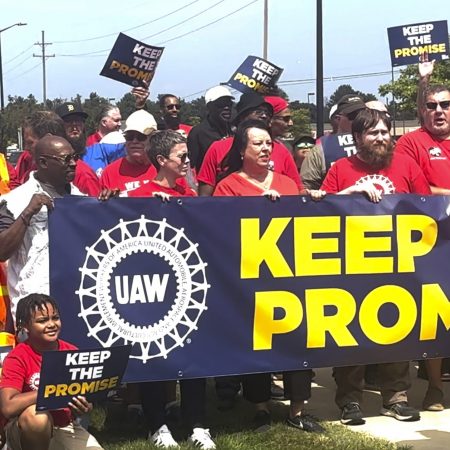Ford agrees to pay up to $165 million penalty to US government for moving too slowly on a recall
DETROIT (AP) — Ford Motor Co. will pay a penalty of up to $165 million to the U.S. government for moving too slowly on a recall and failing to give accurate recall information.
The National Highway Traffic Safety Administration said Thursday that the civil penalty is the second-largest in its 54-year history. Only the fine Takata paid for faulty air bag inflators was higher.
The agency said Ford was too slow to recall vehicles with faulty rearview cameras, and it failed to give the agency complete information, which is required by the Federal Motor Vehicle Safety Act.
Ford agreed to a consent order with the agency that includes a payment of $65 million, and $45 million in spending to comply with the law. Another $55 million will be deferred.
“Timely and accurate recalls are critical to keeping everyone safe on our roads,” NHTSA Deputy Administrator Sophie Shulman said. “When manufacturers fail to prioritize the safety of the American public and meet their obligations under federal law, NHTSA will hold them accountable.”
Under the order, an independent third party will oversee the automaker’s recall performance obligations for at least three years, and Ford has to cooperate with the monitor.
Ford also has to review all recalls over the last three years to make sure enough vehicles have been recalled, and file new recalls if necessary.
The company also must review and change its recall decision-making process, improving the way it analyzes data to find safety defects in its vehicles. It also has to invest in technology so it can trace parts by vehicle identification numbers.
Ford says it will invest the $45 million into advanced data analytics, a new document system, and a new testing lab.
“We appreciate the opportunity to resolve this matter with NHTSA and remain committed to continuously improving safety,” Ford said in a statement.
Under the law, an automaker has to notify NHTSA by filing a defect report within five working days of finding out that a line of vehicles has a safety defect.
The problematic recall of more than 620,000 vehicles in the U.S., over 700,000 in North America, came in September of 2020 for rear-view cameras that can fail on several 2020 models, including the F-Series pickup, the top selling vehicle in the U.S.
In agency documents, NHTSA said Ford found warranty claims about the faulty cameras from February through April of 2020, and the matter was brought to a Ford committee in May of that year.
In July of 2020, NHTSA contacted Ford about complaints it had received about failing cameras, and during an August 2020, meeting with NHTSA, Ford showed data for many 2020 models with high camera failure rates.
The company did the recall on Sept. 23, 2020, and about a year later NHTSA began investigating whether the recall was done quickly enough or included enough vehicles.
In 2022 and 2024, Ford did two more recalls for the same problem, adding about 24,000 vehicles to the first camera recall.
In the consent order, NHTSA said its investigation found that Ford violated multiple parts of the law by moving too slowly to recall vehicles with faulty cameras, giving the agency inaccurate or incomplete information, and failing to turn in required quarterly reports about additional recalls.
The order said that Ford disagreed with its assertions.
For several years, high warranty and recall costs have dinged Ford’s profits, but the company says it’s working to fix the issues.
The penalty doesn’t end conflicts between Ford and NHTSA.
Earlier this year the agency opened an investigation into a Ford SUV recall repair that doesn’t fix gasoline leaks that can cause engine fires. Investigators wrote in an April 25 letter to Ford that they have “significant safety concerns” about a March 8 recall of nearly 43,000 Bronco Sport and Escape SUVs.
Ford said in documents that fuel injectors can crack, allowing gas or vapor to leak near hot engine parts, potentially causing fires and injuries. But the fix is to add a drain tube to send the gas away from hot surfaces and software that cuts off the fuel supply if it detects a leak.
In the letter, the agency’s Office of Defects Investigation wrote that based on its review of the recall fix, it “believes that the remedy program does not address the root cause of the issue and does not proactively call for the replacement of defective fuel injectors prior to their failure.”
Ford said that it has a strong recall process and is committed to complying with the law, but it can always improve. It said it has learned from the camera recall.
“We look forward to working with NHTSA and the independent third party to implement further enhancements,” Ford said.
The post Ford agrees to pay up to $165 million penalty to US government for moving too slowly on a recall appeared first on WDET 101.9 FM.

